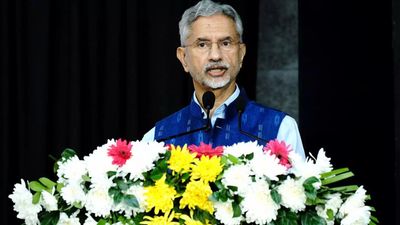NEW DELHI: External affairs minister S Jaishankar on Monday described India’s rise as “an exceptional journey unfolding in a turbulent global era” as he pushed for India’s autonomy in a multipolar world. Speaking at the inaugural Aravalli Summit 2025 at Jawaharlal Nehru University, he said the evolving world order demanded strategic autonomy, multi-alignment, and intellectual renewal.“It appears that it is India’s destiny that its rise take place in an exceptionally turbulent era,” Jaishankar said, reflecting on how global transformations today are far swifter than those that followed the World Wars. “When I look back at my research on the evolution of a global order in the aftermath of a World War, it seems almost glacial in comparison to the mega changes that we are witnessing today.”Jaishankar detailed several forces reshaping the world — from supply chains concentrated in one region to geopolitical rivalries over technology and energy. “A third of global manufacturing has moved to a single geography, with attendant consequences for supply chains. There is rising anti-globalisation sentiment in many societies. Trade calculations are being overturned by tariff volatility,” he said.He said India must continue to navigate this volatility with confidence and foresight. “While the majority are struggling to cope or busy defending their interests, India has to strategise and continue rising amidst such volatility,” he said. “This is by no means a defensive stance. We have to safeguard our interests and yet, continuously advance up the global hierarchy.”Jaishankar further added that India’s foreign policy should be guided by its national interest above all. “Our national interest comes above all, and that should be the final test in foreign policy making,” he said. Defending the country’s doctrine of strategic autonomy, Jaishankar posed a rhetorical question: “Imagine if today, you were not adopting strategic autonomy. Please tell me which country you would like to join up with and put our future in their hands. I can’t think of anybody.”He added that “the more turbulent and unpredictable the global order becomes, the stronger the case for multi-alignment or strategic autonomy. It actually becomes stronger, not weaker.”Expanding on India’s neighbourhood and geopolitical posture, Jaishankar said: “We have multiple neighbours and some are better than others. The hyphenation happens with a neighbour who is not so nice. From our perspective, the best way of de-hyphenation is to outstrip the other party in terms of power and capability.”Calling for greater intellectual and institutional readiness, Jaishankar urged JNU’s School of International Studies to help shape India’s next phase of engagement with the world. “SIS has been at the forefront of developing India’s capability. It has served as an inspiration for the proliferation of international relations studies in the rest of the country,” he said.He also cautioned that new threats to sovereignty were emerging from technology and information flows. “We see an erosion in sovereignty facilitated by tech penetration and manipulation. Global rules and regimes are being revisited and at times even discarded. Cost is no longer the defining criteria for economic transactions; ownership and security are equally so,” he warned.Concluding his address, Jaishankar said India’s ascent would depend not only on strategic agility but also on intellectual self-confidence. “We have to create ideas, terminologies and narratives for the journey to 2047,” he said.

'India's rise taking place in turbulent era': EAM on new world order; challenges lie ahead



